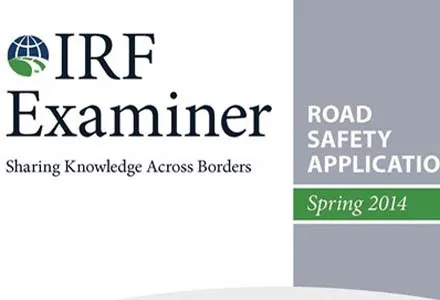In its latest three-year strategic plan, the European Traffic Police Network has reaffirmed its commitment to the European Union’s road death reduction target of 50% by 2020.
World Highways reported last month that road deaths fell by just 1% in the EU in 2014, according to data released by the European Commission. There were 25,700 road deaths across all 28 Member States of the EU.
The European Commissioner of Transport, Violeta Bulc said at the time that the statistics give some cause for concern. S
April 2, 2015
Read time: 3 mins
In its latest three-year strategic plan, the European Traffic Police Network has reaffirmed its commitment to the 1116 European Union’s road death reduction target of 50% by 2020.
3260 World Highways %$Linker: 2 Internal <?xml version="1.0" encoding="utf-16"?><dictionary /> 2 21216 0 oLinkExternal reported last month Visit concern at european road safety issues page false /sections/general/news/concern-at-european-road-safety-issues/ false false %> that road deaths fell by just 1% in the EU in 2014, according to data released by the 2465 European Commission. There were 25,700 road deaths across all 28 Member States of the EU.
The European Commissioner of Transport, Violeta Bulc said at the time that the statistics give some cause for concern. She said significantly more effort will be needed from Member State governments in order to reach the Commission's goal to halve the number of road deaths between 2010 and 2020.
The London-based European Traffic Police Network –4753 TISPOL – also noted at the time that achieving the 50% reduction by 2020 will now be much more challenging than previously thought.
TISPOL general secretary Ruth Purdie, a former chief officer within the United Kingdom police service, said that Europe had led the way in driving down the number of people killed and seriously injured on the roads. “Police enforcement has played a vital role in this. But the past few years have seen increasing pressure on public finances across Europe. Road policing resources have suffered and it appears further big cuts are coming.
“The latest figures are very disappointing, and show that member states can’t back out of road safety without consequences. So we call on governments to act now and protect their citizens through better funded road policing, because we know this will lead to immediate improvements in road safety and security,” she said.
TISPOL’s three-year strategic plan 2015-2017 sets out how TISPOL will play its part in reducing deaths, serious injuries and crimes on Europe’s roads and in the process making it what it hopes will be the most effective police road safety network in the world.
“In July 2010 the European Commission published a set of ‘Road Safety Policy Orientations’, a framework with the objective of reducing road deaths by 50% by 2020,” said TISPOL president Aidan Reid, from Ireland. “We in TISPOL remain committed to working with the European Commission to support the achievement of the 2020 target.”
Some of TISPOL’s own statistics, according to its %$Linker:2 External <?xml version="1.0" encoding="utf-16"?><dictionary /> 0 0 0 oLinkExternal annual report 2014 Visit TISPOL’s own statistics report false https://www.tispol.org/system/files/TISPOL%20Annual%20Report%202014%2023Feb15.pdf false false %>, were nearly 1.2 million speeding offences detected and more than 2 million tests for alcohol and drugs, with almost 35,000 offences detected. TISPOL also had 27,690 crimes reported as a result of its safety checks during 10 operations.
Central to TISPOL’s latest strategic plan is a commitment to partnership working, said Reid. “We wish to make the best possible use of our already successful collaborations with the European Commission, our member states and our partners and stakeholders. These partnerships include other law enforcement organisations, public sector bodies and private enterprise.”
Four strategic objectives form the centrepiece of the plan: a safer road network for all users; detecting and preventing crime on roads; engaging in effective partnership activity; and ensuring an efficient organisational and financial plan.
TISPOL’s policy document can be viewed by %$Linker:2 External <?xml version="1.0" encoding="utf-16"?><dictionary /> 0 0 0 oLinkExternal clicking here Visit TISPOL’s policy document false https://www.tispol.org/system/files/TISPOLStrategyDocument2015.pdf false false %>.
The European Commissioner of Transport, Violeta Bulc said at the time that the statistics give some cause for concern. She said significantly more effort will be needed from Member State governments in order to reach the Commission's goal to halve the number of road deaths between 2010 and 2020.
The London-based European Traffic Police Network –
TISPOL general secretary Ruth Purdie, a former chief officer within the United Kingdom police service, said that Europe had led the way in driving down the number of people killed and seriously injured on the roads. “Police enforcement has played a vital role in this. But the past few years have seen increasing pressure on public finances across Europe. Road policing resources have suffered and it appears further big cuts are coming.
“The latest figures are very disappointing, and show that member states can’t back out of road safety without consequences. So we call on governments to act now and protect their citizens through better funded road policing, because we know this will lead to immediate improvements in road safety and security,” she said.
TISPOL’s three-year strategic plan 2015-2017 sets out how TISPOL will play its part in reducing deaths, serious injuries and crimes on Europe’s roads and in the process making it what it hopes will be the most effective police road safety network in the world.
“In July 2010 the European Commission published a set of ‘Road Safety Policy Orientations’, a framework with the objective of reducing road deaths by 50% by 2020,” said TISPOL president Aidan Reid, from Ireland. “We in TISPOL remain committed to working with the European Commission to support the achievement of the 2020 target.”
Some of TISPOL’s own statistics, according to its %$Linker:
Central to TISPOL’s latest strategic plan is a commitment to partnership working, said Reid. “We wish to make the best possible use of our already successful collaborations with the European Commission, our member states and our partners and stakeholders. These partnerships include other law enforcement organisations, public sector bodies and private enterprise.”
Four strategic objectives form the centrepiece of the plan: a safer road network for all users; detecting and preventing crime on roads; engaging in effective partnership activity; and ensuring an efficient organisational and financial plan.
TISPOL’s policy document can be viewed by %$Linker:







